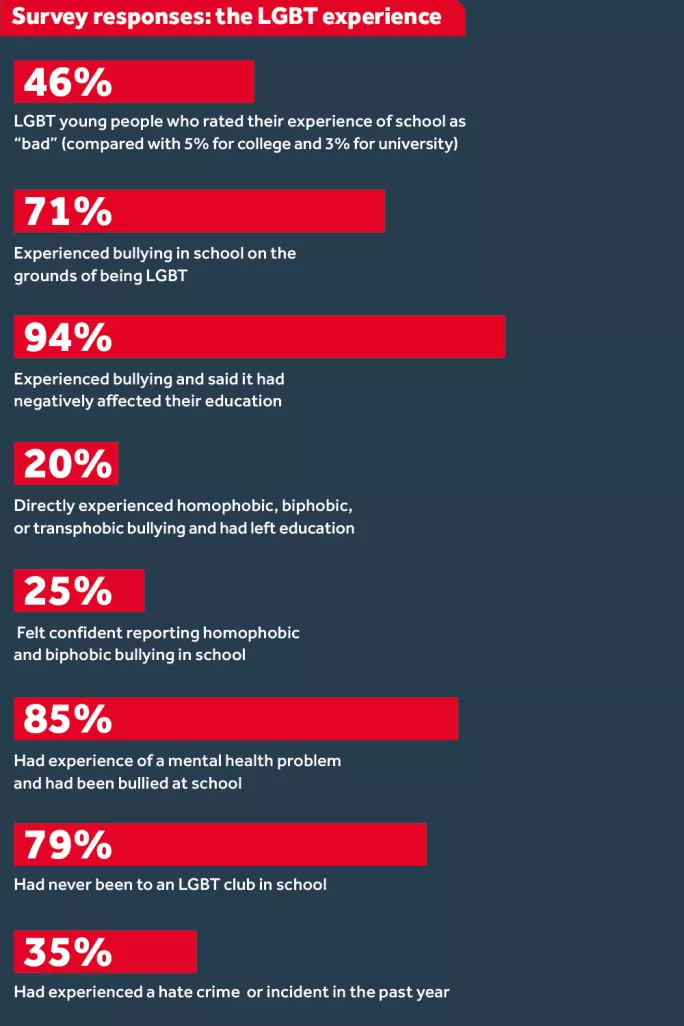LGBT pupils face ‘shocking’ homophobia in schools

Schools still force LGBT pupils to run a gauntlet where bullying is routine, few feel they can turn to teachers and many leave with their education and mental health in ruins, a new report has found.
Pupils report their experience being worse than that of college and university students. One trans person heard teachers describing him as a “freak” and another was told by numerous pupils to kill himself.
A survey of 684 LGBT young people aged 13-25 in 2017 - the first by LGBT Youth Scotland since 2012 - paints a grim picture of school: 46 per cent of LGBT young people rated their overall experience there as “bad”, whereas students were far less likely to have a bad experience in college or university.
The findings of Life in Scotland for LGBT Young People were presented at a Children in Scotland conference in Edinburgh yesterday. It finds that 81 per cent have experienced at least one form of homophobic, biphobic or transphobic bullying during their time in education - 41 per cent suffer physical assaults - with this most likely to take place in school.
One young person said: “I was often called a ‘tranny’ or ‘dyke’ and told to kill myself by numerous pupils throughout high school.”
Nearly all said the bullying had negatively affected their education. Around a fifth of LGBT students drop out of education after direct experience of homophobic, biphobic or transphobic bullying. Yet only a quarter of respondents felt comfortable reporting homophobic or biphobic bullying in school, far less than in college or university.
Cara Spence, LGBT Youth Scotland senior programmes and influencing manager, says that school-based bullying appears to have risen in the past decade, which could reflect more pupils feeling confident about coming out at school and more recognising that bullying is not acceptable.
“However, it looks like the overall picture hasn’t improved significantly for LGBT young people in Scottish schools,” says Spence.
She is “shocked” that more than half of transgender respondents had experienced physical assault in an education setting, but stresses that problems are sometimes more subtle: some young people leave education despite not having been bullied, but because of less overt homophobia and transphobia.
She adds that “there’s some great work happening in schools across Scotland to improve the lives of LGBT young people”, which tends to involve “whole-school approaches”, strong CPD and initiatives where young people take the lead.
‘Responsibility as educators’
Aberdeen teacher John Naples-Campbell, who in 2014 was awarded the first GTCS (General Teaching Council for Scotland) Professional Recognition Award for Equality and Diversity for his work raising awareness of LGBT issues, highlights that Scotland last year reportedly became the first country in the world to win majority parliamentary support for the teaching of LGBT issues in schools.
However, he still sees a “postcode lottery” in school approaches to LGBT issues, adding: “Staff who don’t include any form of LGBT education in their curriculum - or don’t see it as their responsibility to tackle the issue in their classroom - forget they have a responsibility as educators to make sure every child, no matter their gender or sexuality, feels safe and secure in their learning environment.”
Emily Frood, a university student in Edinburgh who came out as trans in her final year at school in 2015, says: “My family were and still are amazing - and I had my local LGBT Youth Scotland support group. However, it still took a large effort to be comfortable coming to school as Emily. My process felt like a negotiation rather than staff accepting my identity and supporting my coming out.”
School Leaders Scotland general secretary Jim Thewliss says that the survey findings “are certainly disappointing”, but hopes that the Scottish government’s LGBTI Inclusive Education Working Group will bring about “meaningful change”.

Andrea Bradley, EIS teaching union assistant secretary, sees a need for more professional learning for teachers on equality, more pupil support teachers and more time “to develop and implement robust equality policies”.
Euan Duncan, a professional officer for the Scottish Secondary Teachers’ Association and a guidance teacher, says: “Although they are not as common as they need to be, some schools now have well-established LGBT groups.” He adds that local budget cuts - for example, to home-school link workers and school support staff - could undermine the “growing number of schools working hard to improve the way in which LGBT young people are supported”.
A spokesman for local authorities body Cosla says: “School staff, alongside other council staff, are working hard to ensure that the school environment is a safe and inclusive one for every young person.”
You need a Tes subscription to read this article
Subscribe now to read this article and get other subscriber-only content:
- Unlimited access to all Tes magazine content
- Exclusive subscriber-only stories
- Award-winning email newsletters
Already a subscriber? Log in
You need a subscription to read this article
Subscribe now to read this article and get other subscriber-only content, including:
- Unlimited access to all Tes magazine content
- Exclusive subscriber-only stories
- Award-winning email newsletters